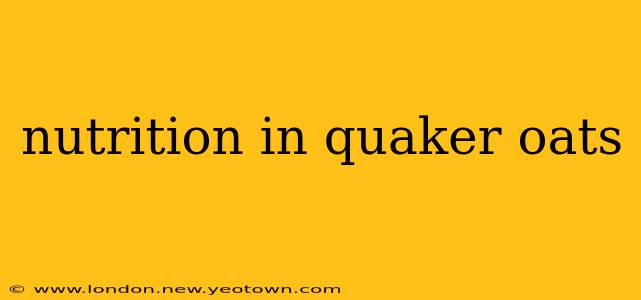Quaker Oats. The name conjures images of warm, comforting breakfasts, but beyond the delicious taste lies a nutritional powerhouse packed with benefits for your health. Let's unravel the secrets of this humble grain and explore why it's been a breakfast staple for generations.
My journey into the world of Quaker Oats began with a simple question: "What exactly is so good about this stuff?" My research took me down a fascinating path, revealing a surprisingly complex nutritional profile far beyond the typical "good for you" breakfast perception. I'll share my findings with you, hoping to demystify the nutritional value and answer some frequently asked questions along the way.
What are the main nutritional benefits of Quaker Oats?
Quaker Oats are a nutritional powerhouse, boasting a remarkable array of benefits. They’re an excellent source of soluble fiber, known for its ability to lower cholesterol levels and improve heart health. This fiber also helps regulate blood sugar levels, making oats a fantastic choice for individuals with diabetes or those looking to manage their blood sugar. Beyond fiber, oats are a good source of essential vitamins and minerals, including manganese, magnesium, and phosphorus – all vital for various bodily functions. The protein content, though not as high as some other sources, still contributes to satiety, keeping you feeling full and energized.
Are Quaker Oats good for weight loss?
This is a question I frequently encountered during my research. The answer isn’t a simple yes or no. While Quaker Oats aren't a magic weight-loss bullet, they can certainly contribute to a healthy weight management plan. The high fiber content promotes satiety, meaning you feel full for longer, reducing overall calorie intake. Furthermore, the slow-releasing carbohydrates provide sustained energy, preventing those mid-afternoon energy crashes that often lead to unhealthy snacking. However, it's crucial to remember that weight loss is a holistic process involving a balanced diet and regular exercise. Oats are a helpful tool, but not a standalone solution.
How many calories are in a serving of Quaker Oats?
Calorie count varies depending on the type of oats and serving size. A typical serving of dry rolled oats (1/2 cup) contains around 150 calories. However, additions like milk, sugar, or fruit will significantly increase the overall calorie count. Always check the nutritional information on the packaging for the most accurate figures. Remember, calorie counting is just one piece of the puzzle; focusing on the overall nutritional profile is equally important.
What are the differences between different types of Quaker Oats?
The market offers several Quaker Oats varieties, each with its own characteristics. Rolled oats (old-fashioned oats) retain their bran and germ, offering the highest fiber content. Steel-cut oats are less processed and take longer to cook, resulting in a chewier texture and slightly higher fiber content than rolled oats. Quick-cooking oats are more processed, resulting in a faster cooking time but a slightly lower fiber content. Instant oats are the most processed, offering convenience but sacrificing some of the nutritional benefits compared to less-processed varieties. The best choice ultimately depends on your personal preferences and time constraints.
Are there any potential downsides or side effects of eating Quaker Oats?
While generally safe and beneficial, some individuals might experience digestive discomfort, such as bloating or gas, particularly when initially increasing their oat consumption. This is often due to the high fiber content. Gradually increasing your intake can help your body adjust. Also, those with celiac disease or gluten sensitivity should opt for certified gluten-free oats, as cross-contamination during processing can occur.
What's the best way to prepare Quaker Oats?
The beauty of Quaker Oats lies in their versatility! They can be enjoyed hot or cold, incorporated into various recipes, or simply prepared as a warm bowl of porridge. The preparation method depends on the type of oats. Rolled oats typically require around 5-10 minutes of cooking, while quick-cooking oats take less time. Instant oats can be prepared by simply adding hot water or milk. Experiment with different toppings and additions to personalize your oat bowl, keeping in mind your overall dietary goals.
My journey exploring Quaker Oats has revealed a fascinating story of nutritional value and versatility. It’s more than just a breakfast; it's a cornerstone of a healthy lifestyle, offering a wealth of benefits when incorporated as part of a balanced diet. Remember to choose the type of oats that best suits your needs and always pay attention to portion sizes for optimal health benefits.

